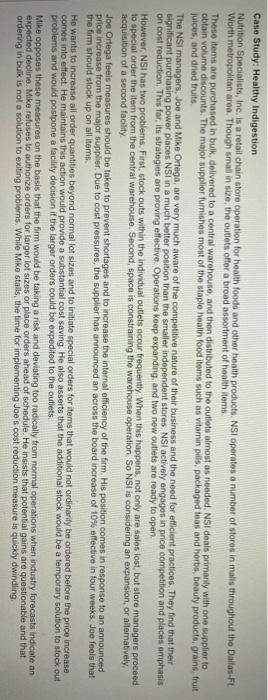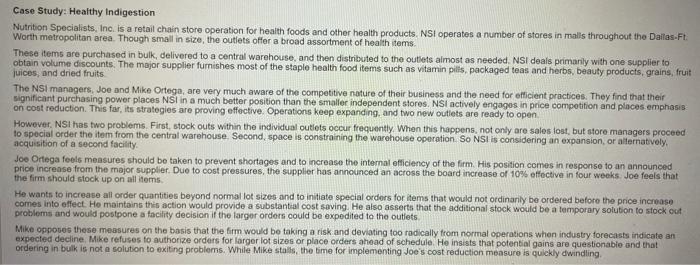Answer the following questions for the case study
1.What purchasing, distribution, and inventory should be considered in order to resolve the conflict?
2. Do these factors validate Mikes argument? Do they substantiate Joe's proposed measured?
3. What other factors should be considered

1. What purchasing, distribution, and inventory factors should be considered in order to resolve the conflict? 2. Do these factors validate Mike's argument? Do they substantiate Joe's proposed measured? 3. What other alternatives should be considered? Case Study: Healthy Indigestion Nutrition Specialists, Inc. is a retail chain store operation for health foods and other health products, NSi operates a number of stores in malls throughout the Dallas-Ft Worth metropolitan area. Though small in size, the outlets offer a broad assortment of health items These items are purchased in bulk, delivered to a central warehouse, and then distributed to the outlets almost as needed. NSI deals primarily with one supplier to obtain volume discounts. The major supplier fumishes most of the staple health food items such as vitamin pills, packaged teas and herbs, beauty products, grains, fruit juices, and dried fruits The NSi managers, Joe and Mike Ortega, are very much aware of the competitive nature of their business and the need for efficient practices. They find that their significant purchasing power places NSI in a much better position than the smaller independent stores, NSi actively engages in price competition and places emphasis on cost reduction. This far, its strategies are proving effective. Operations koop expanding, and two new outlets are ready to open However, NSi has two problems. First, stock outs within the individual outlets occur frequently When this happens, not only are sales lost, but store managers proceed to special order the item from the central warehouse. Second, space is constraining the warehouse operation So NSI is considering an expansion, or alternatively acquisition of a second facility Joe Ortega feeis measures should be taken to prevent shortages and to increase the internal efficiency of the firm. His position comes in response to an announced price increase from the major supplier. Due to cost pressures, the supplier has announced an across the board increase of 10% offective in four weeks. Joe feels that the firm should stock up on all items He wants to increase all order quantities beyond normal lot sizes and to initiate special orders for items that would not ordinarily be ordered before the price increase comes into effect. He maintains this action would provide a substantial cost saving. He also asserts that the additional stock would be a temporary solution to stock out problems and would postpone a facility decision if the larger orders could be expedited to the outlets Mike opposes these measures on the basis that the firm would be taking a risk and deviating too radically from normal operations when industry forecasts indicate an expected decline. Mike refuses to authorize orders for larger lot sizes or place orders ahead of schedule. He insists that potential gains are questionable and that ordering in bulk is not a solution to exiting problems. While Mike stalls, the time for implementing Joe's cost reduction measure is quickly dwindling 1. What purchasing, distribution, and inventory factors should be considered in order to resolve the conflict? 2. Do these factors validate Mike's argument? Do they substantiate Joe's proposed measured? 3. What other alternatives should be considered? Case Study: Healthy Indigestion Nutrition Specialists, Inc. is a retail chain store operation for health foods and other health products. NSI operates a number of stores in malls throughout the Dallas-Ft: Worth metropolitan area. Though small in size, the outlets offer a broad assortment of health items. These items are purchased in bulk, delivered to a central warehouse, and then distributed to the outlets almost as needed. NSI deals primarily with one supplier to obtain volume discounts. The major supplier furnishes most of the staple health food items such as vitamin pills, packaged teas and herbs, beauty products, grains, fruit juices, and dried fruits The NSi managers, Joe and Mike Ortega, are very much aware of the competitive nature of their business and the need for efficient practices. They find that their significant purchasing power places NSI in a much better position than the smaller independent stores, NSi actively engages in price competition and places emphasis on cost reduction. This for its strategies are proving effective. Operations keep expanding, and two new outlets are ready to open However, NSi has two problems. First, stock outs within the individual outlets occur frequently. When this happens, not only are sales lost, but store managers proceed to special order the item from the central warehouse. Second, space is constraining the warehouse operation So NSI is considering an expansion or alternatively, acquisition of a second facility Joo Ortega feels measures should be taken to prevent shortages and to increase the internal efficiency of the firm. His position comes in response to an announced price increase from the major supplier. Due to cost pressures, the supplier has announced an across the board increase of 10% effective in four weeks. Joe feels that the firm should stock up on all items He wants to increase all order quantities beyond normal lot sizes and to initiate special orders for items that would not ordinanly be ordered before the price increase comes into offect. Ho maintains this action would provide a substantial cost saving. He also asserts that the additional stock would be a temporary solution to stock out problems and would postpone a facility decision if the larger orders could be expedited to the outlets Mike opposes these measures on the basis that the firm would be taking a risk and deviating too radically from normal operations when industry forecasts indicate an expected decline, Mike refuses to authorize orders for larger lot sizes or place orders ahead of schedule. Ho insists that potential gains are questionable and that ordering in bulk is not a solution to exiting problems. While Mike stalls, the time for implementing Joe's cost reduction measure is quickly dwindling











